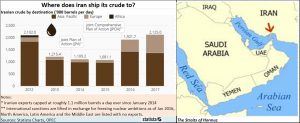http://www.freepressjournal.in/analysis/can-the-us-push-oil-to-usd-250-a-barrel-r-n-bhaskar/1314064
The US roils the oil markets again
— By | Jul 12, 2018 07:31 am
Last week, Artem Avinov, leading analyst with TeleTrade, predicted that oil prices could jump to $250 per barrel if the Strait of Hormuz is blocked by Iran. This was duly reported by www.rt.com (https://www.rt.com/business/432075-iran-strait-hormuz-oil-prices/).
Iran threatens to block the Strait of Hormuz in case the US makes any attempt to prevent its export of oil. Is this possible? Yes. All that Iran has to do is to send a couple of oil tankers into the strait and blow them up. The narrow passage will get blocked (see map). That will block the exports of Saudi Arabia, UAE and Iraq as well.
 Iran (and Europe) are opposed to the IS decision to tear up the nuclear treaty which had been ratified by all, including the UN. Instead, the US wants to sanction Iran, unilaterally. It has urged (actually ordered) all countries to stop dealing with any product coming out of Iran. India imports substantial quantities of oil from Iran.
Iran (and Europe) are opposed to the IS decision to tear up the nuclear treaty which had been ratified by all, including the UN. Instead, the US wants to sanction Iran, unilaterally. It has urged (actually ordered) all countries to stop dealing with any product coming out of Iran. India imports substantial quantities of oil from Iran.
Iran’s retaliatory threat raises the stakes further.
Is Iran wrong? If one looks at history, Iran is perfectly within its rights in making this declaration and even acting on it. Iran has announced a unilateral response threat to a unilateral move by the US.
Can Iran be justified? Yes. Really? This is where history helps. Unlike the US, Iran is an ancient civilisation. . . . .Its lineage goes back to the Persian civilisation, and boasts of giants like Cyrus and Darius the Great.
Moreover, people often forget that the UK and USA have constantly needled Iran. In 1951, Mohammad Mosaddegh nationalised Iran’s petroleum industry because the UK would not allow Iran to get fair royalties for the oil extracted in its region. Mosaddegh was the head of a popular, democratically elected government. But he was allegedly removed in a coup orchestrated by both the CIA and the UK’s Secret Intelligence Service. The reason? Oil revenues were at stake.
The US and the UK then helped instal the west-leaning Shah Reza Pahlavi as head of Iran. But the tipping point against the fawning Shah occurred in 1979 when he agreed to the US demand that no US citizen could be tried by an Iranian court, even for crimes committed inside Iran. Popularly referred to as the capitulation clause, it wounded national pride, and caused an uproar of protest. The Shah was overthrown and Ruhollah Khomeini became the Supreme Leader in Iran. The path against the US was more resolute than ever before.
Later, the US armed Saddam Hussein to unilaterally to wage a war against Iran. It was only when Saddam invaded Kuwait, that the US sought UN resolutions against Saddam. But Europe refused to support the US. To make the Europeans support its move, the US allowed public relations agency H&K to fabricate a story — that was even taken up by the US Senate — about a Kuwaiti princess Nayirah, who witnessed Iraqi soldiers killing 14 prematurely born babies by ripping apart their oxygen tents (https://en.wikipedia.org/wiki/Nayirah_testimony). Revulsion against this incident, persuaded Europe to support the US in the UN. Several years later, a Canadian investigative journalist discovered that there was no Kuwaiti princess at all. It was a story planted to sway public opinion against Iraq.
Subsequently, the US invaded Iraq, helped obliterate Libra and almost destroyed Syria. When France refused to support the US in the Iraq invasion, it was savagely ridiculed.
Today, the US is trying to play the same game of unilateralism. It has refused to honour an agreement on Iran that the US and other UN Security Council members had ratified. Once again the US has the same war cry “If you are not with us, you are against us”. Result: Millions around the world – including this quthor – became disenchanted by the US. It once defended values. Not any more today.
During the past 75 years the US is the only country that has used weapons of mass destruction, with impunity. It refuses to be a state party to the Rome Statute of the International Criminal Cour — to ensure that no American ever stands trial before an international court (https://en.wikipedia.org/wiki/United_States_and_the_International_Criminal_Court) .
So what does India do? At $75 a barrel, oil is already hurting; at $250, India will bleed. The US insists that India suspend all import of Iranian oil. India cannot afford to displease the US, but India should not allow the rule of unilateralism to prevail.
So will India join hands with the EU and China and call the US Bluff? Or will they move to defang the US by working towards another global currency. Without its control over the currency, the US cannot control banks, and hence even trade. Or should everyone prepare for Armageddon?





































COMMENTS